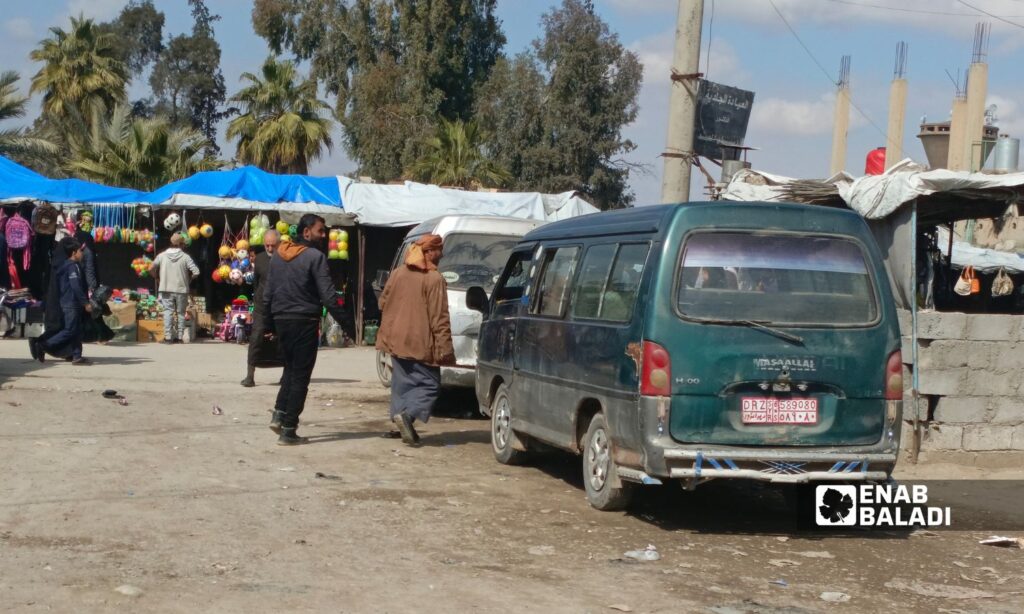The countryside of Deir Ezzor, under the control of the Syrian Democratic Forces (SDF), is witnessing an increase in transportation fares due to the rise in fuel prices, and the absence of a set tariff.
The fares for transportation vehicles (minibuses) have increased by up to 40% within the areas of Deir Ezzor’s countryside, where the rise in fuel prices has reflected on the operating and maintenance costs of vehicles. Additionally, private taxi cars in the region do not adhere to a set fare rate.
Fare determined by the driver
Mezar al-Ibrahim (45 years old), a minibus driver, said that the increase in transport fares does not depend on official decisions but comes from the drivers themselves, adjusting the fare in line with covering costs from fuel prices and maintenance.
The driver explained to Enab Baladi that setting the fare rate is linked to the exchange rates of the Syrian pound and fuel prices. For instance, the Fuel Authority supplies each minibus with the equivalent of 80 liters of diesel at a price of 450 Syrian pounds per liter every four months.
The quality of the provided diesel is low and resembles heating oil, unsuitable for operating transport machinery. Therefore, the drivers raise the fare by mutual agreement, which may be temporary and changes based on the fluctuation of exchange rates and fuel prices, according to al-Ibrahim.
A liter of diesel is sold at the fuel stations for 5,000 Syrian pounds, with each US dollar equivalent to 14,550 Syrian pounds.
An employee at the municipality of al-Basira in the eastern countryside of Deir Ezzor (who preferred not to be named as he is not authorized to speak to the media), told Enab Baladi that there are several reasons for the rise in transportation costs in his city, the first being the lack of diesel fuel support.
He added that the Civil Council in the countryside of Deir Ezzor has not made any decision to regulate the transportation fare, due to its lack of control over the transport sector workers and the lack of support from the council.
Minibuses in al-Basira city, the eastern countryside of Deir Ezzor – February 22, 2024 (Enab Baladi/Obadah al-Sheikh)
Impact on citizens and goods
Yasmin al-Khateeb from the village of Juma in the eastern countryside of Deir Ezzor, who works at a women’s clothing store in the town of Suwaidan, said that she spends “a quarter of her daily wage” on transportation fares, as she needs 10,000 Syrian pounds per day to travel to and from her work, where she earns 40,000 Syrian pounds per day.
Al-Khateeb expressed her displeasure to Enab Baladi about the instability of transportation fares, noting that prices regularly increase.
On the other hand, Murad al-Hammadi (55 years old) from the city of Hajin, east of Deir Ezzor, and a father of two university students in Al-Furat university in Deir Ezzor (under the control of the regime forces), told Enab Baladi that each student needs about 300,000 Syrian pounds for each trip to the university located in the city of Deir Ezzor. He mentioned that the cost of traveling from Hajin to al-Jeneina crossing west of Deir Ezzor is up to 125,000 Syrian pounds per person.
Transportation costs also affect the prices of foodstuffs and goods, which traders cite as a reason to raise the prices of foodstuffs and commodities.
Areas under the control of the Autonomous Administration of North and East Syria (AANES) are experiencing a periodic rise in transport prices, coinciding with the increase in fuel prices and the depreciation of the Syrian pound against the dollar, along with other factors contributing to the rise in travel costs.

